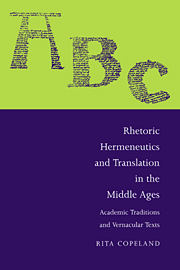Book contents
- Frontmatter
- Contents
- Acknowledgments
- List of abbreviations
- Introduction
- 1 Roman theories of translation: the fusion of grammar and rhetoric
- 2 From antiquity to the Middle Ages I: the place of translation and the value of hermeneutics
- 3 The rhetorical character of academic commentary
- 4 Translation and interlingual commentary: Notker of St. Gall and the Ovide moralisé
- 5 Translation and intralingual reception: French and English traditions of Boethius' Consolatio
- 6 From antiquity to the Middle Ages II: rhetorical invention as hermeneutical performance
- 7 Translation as rhetorical invention: Chaucer and Gower
- Afterword
- Notes
- Bibliography
- 1 Index of names and titles
- 2 General index
3 - The rhetorical character of academic commentary
Published online by Cambridge University Press: 03 December 2009
- Frontmatter
- Contents
- Acknowledgments
- List of abbreviations
- Introduction
- 1 Roman theories of translation: the fusion of grammar and rhetoric
- 2 From antiquity to the Middle Ages I: the place of translation and the value of hermeneutics
- 3 The rhetorical character of academic commentary
- 4 Translation and interlingual commentary: Notker of St. Gall and the Ovide moralisé
- 5 Translation and intralingual reception: French and English traditions of Boethius' Consolatio
- 6 From antiquity to the Middle Ages II: rhetorical invention as hermeneutical performance
- 7 Translation as rhetorical invention: Chaucer and Gower
- Afterword
- Notes
- Bibliography
- 1 Index of names and titles
- 2 General index
Summary
When Quintilian presents his version of Aristotle's division of the sciences into theoretical, practical, and productive, he identifies rhetoric chiefly with the practical sciences, which are concerned with action (Institutio oratorio, 2.18.1–5). For Quintilian as for Cicero, rhetoric, as a mastery of political and social discourse, represents the highest art, the fulfillment even of philosophy. Thus it is not surprising that Quintilian's model of the sciences should implicitly give precedence to the practical sciences, which demand action, rather than to the theoretical or exact sciences. For Quintilian, as we have seen, the theoretical sciences occupy a restricted sphere: they are concerned with a kind of knowledge “which demands no action, but is content to understand the subject of its study.” It is in terms of this reckoning of theoretical sciences that Quintilian restricts the competence of grammar and of grammatical enarratio poetarum.
Quintilian's version of the classification of the sciences provides a good reference point for the discussion here of the change in the status of grammar from antiquity to the Middle Ages. If we see the value of rhetoric and grammar in the Middle Ages in terms of the inaugural formulations of their relationship in Roman models of the sciences, we can understand how enarratio exceeded the disciplinary restrictions that rhetoric imposed on it in antiquity. As hermeneutical appropriation of the materials of the past, medieval enarratio reaches beyond the limits of what Quintilian would have considered an exact science to constitute a form of a relative or practical science. It does not simply treat the text as a pre-given universal for which philological science can supply a fixed exposition.
- Type
- Chapter
- Information
- Rhetoric, Hermeneutics, and Translation in the Middle AgesAcademic Traditions and Vernacular Texts, pp. 63 - 86Publisher: Cambridge University PressPrint publication year: 1991



